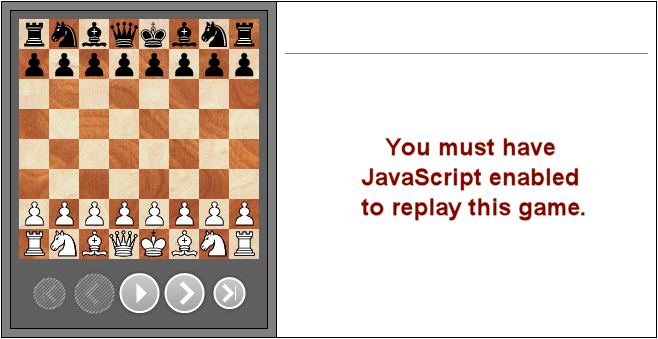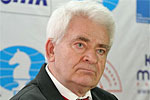Boris Spassky, Tenth World Champion
Boris Vasilievich Spassky (Russian: Бори́с Васи́льевич Спа́сский) was born on January 30, 1937 in Leningrad, Soviet Union, which is of course today known as Saint Petersburg. Boris learned the moves at the age of five, during a train ride in which citizens of Leningrad were being evacuated during the 1941-1944 siege of the city by the German Wehrmacht.

Boris around 1948 |
Spassky was a classical child prodigy and gained nation-wide attention by beating the Soviet Champion Mikhail Botvinnik in a simultaneous exhibition in 1947, at the age of ten. At 16 he played successfully in a strong international tournament in Bucharest, Romania, and at 18 he won the World Junior Chess Championship in Antwerp, Belgium. The GM title was awarded to him that year, which was a record at the time. In 1956 he qualified for the Candidates Tournament for the first time, in Amsterdam, and finished in the middle of the ten-player world-class field. He was just 19.
Unfortunately the youthful Spassky had a bad period and failed to qualify, as everyone had expected him to, in the world championship cycles from 1958 and 1961. He switched trainers, moving from the uncompromising attacking genius Alexander Tolush to the calm strategist Igor Bondarevsky. This proved to be fruitful and he won his first of two USSR Championships at Baku in 1961. He qualified for the Amsterdam Interzonal in 1964, and qualified for the Candidates' Matches the next year.
 Boris in 1960 Boris in 1960 |
Spassky became the ultimate all-rounder on the chess board, who could easily adapt his style to suit the needs of the moment. Against Keres he was a strategist, against Geller the wild attacker, and against Mikhail Tal he would steer the game into quiet waters where the great tactician could find no target to attack.
In 1966 Spassky played his first world championship match, against Tigran Petrosian. He lost it +3, =17, –4, but became the next challenger after beating Geller, Larsen and Korchnoi in Candidates matches. In 1969 he beat Petrosian by two points and became the tenth world champion in history. He lost the title to Bobby Fischer in the "Match of the Century" three years later.
The match against Fischer took place in Reykjavík, Iceland, at the height of the Cold War, and became a symbol of the political confrontation between the two superpowers. Before this match Fischer had never beaten Spassky, drawing twice and losing three times in their previous encounters. In Reykjavik, however, Fischer was able to triumph quite easily, in spite of losing the first game and forfeiting the second.

Spassky playing GM Jan Hein Donner at the Olympiad in Nice, 1974
After the Fischer match Spassky won a number of important events, including the 1973 Soviet championship, but was eliminated from the 1974 Candidates cycle by a new young star, Anatoly Karpov. Spassky again qualified for the Candidates in 1977, but was defeated by Viktor Korchnoi. Since then his career has been marked by a love for the finer sides of life that exceeded chess ambition. He settled in France with his third wife, became a French citizen and only played occasionally, relying on natural talent rather than intense preparation to achieve respectable scores.
In 1992 Spassky played the "Revenge Match of the 20th century" against Fischer in Sveti Stefan (Montenegro) and Belgrade, losing it with a score of +5, –10, =15, but winning a substantial amount of money in the process.
In October 2006 Spassky suffered a minor stroke, from which he recovered well. On September 23 2010 he suffered a more serious stroke that left him paralyzed on his left side. He returned to France for a long rehabilitation programme, where he is recovering well.
We spoke with Boris Vasilievich a few weeks ago, on Skype with video switched on, and found him in good spirits – in fact offering to visit Hamburg and record a couple of DVDs with us ("in the summer, when the weather is better"). He moved around the room – to fetch things to show us – and was his normal, humorous self. The stroke, he said, was on one side of his brain, fortunately "not the side that is required for speaking and thinking – or playing chess." He summarized his current state of health as follows: "I am in the endgame now, which is the most difficult part of the game. But I am still okay." We really look forward to welcoming Boris and his wife Marina in Hamburg.
Interview
German chess journalist Dagobert Kohlmeyer spoke to Boris Spassky on his 50th birthday. The interview is published on our German news page, which can be read using Google's translation service (that appears automatically in Chrome). Here are some highlights:
Which of the great chess players have been your friends?
My closest friends were Anderssen, Morphy, Chigorin, Capablanca and Alekhine – even though I never met them in person (laughs). But joking aside, from my generation it was Mischa Tal and Bobby Fischer. I was very fond of Tal, and I respect him to this day. I also think of Bobby every day.
What was Fischer's strongest character trait?
Bobby Fischer was mainly a tough fighter. He had this absolute will to win, and that is why he was such a great success. But in practical life Bobby was not a fighter at all. There he made many mistakes. Fischer never made compromises – neither in chess nor in life.
What was once your favorite opening? In your youth you liked to play the King's Gambit...
No, that's not entirely true. It happened later. I only began to do so when I became a grandmaser. In the hands of a GM the King's Gambit is a much more a dangerous weapon than in the hands of chess players with lower qualifications.
I remember your famous game against David Bronstein from 1960.
Yes, that's one of my favorite games. I don't just like this game, but also the story around it. Bronstein himself liked to play the King's Gambit. He was not at all happy that I sacrificed a whole rook in this opening against him, and actually beat him with his own Bronstein weapon. It has rankled him quite a bit.

[Event "URS-ch27"] [Site "Leningrad"] [Date "1960.??.??"] [Round "?"] [White "Spassky, Boris V"] [Black "Bronstein, David I"] [Result "1-0"] [ECO "C36"] [Annotator "ChessBase"] [PlyCount "45"] [EventDate "1960.??.??"] [EventType "tourn"] [EventRounds "19"] [EventCountry "URS"] [Source "ChessBase"] [SourceDate "1999.07.01"] 1. e4 e5 2. f4 exf4 3. Nf3 d5 4. exd5 Bd6 5. Nc3 $6 (5. Bb5+ $1 Bd7 6. Bxd7+ Nxd7 7. O-O Ne7 8. c4 O-O 9. d4 b6 10. Nc3 Ng6 11. Qd3 Nf6 12. Bd2 Qd7 13. Rae1 Rae8 14. a3 a5 15. Nb5 $16 {Gurgenidze-Radovici/Tbilisi/1960/}) 5... Ne7 6. d4 O-O (6... c6 $5 {-> C 31: 2...d5 3.ed5 c6 4.Nc3 ef4 5.Nf3 Bd6 6.d4 Ne7 7.Bd3 / 7.Bc4 / 7.dc6}) 7. Bd3 Nd7 $6 (7... Bf5 $5) 8. O-O h6 $2 (8... Nf6 $5 9. Ne5 Nfxd5 10. Nxd5 Nxd5 11. Bxf4 Nxf4 12. Rxf4 Qg5 $1 $10) (8... Ng6 $5 9. Ne4 Nf6 10. Nxd6 Qxd6 11. c4 Bg4 $13) 9. Ne4 $1 Nxd5 10. c4 Ne3 11. Bxe3 fxe3 12. c5 Be7 13. Bc2 $1 (13. Qe2 Nf6 14. Qxe3 Nd5 $13) 13... Re8 14. Qd3 e2 $2 (14... Nf8 $1) 15. Nd6 $5 (15. Rf2 $1 $16) 15... Nf8 $6 (15... Bxd6 $5 16. Qh7+ Kf8 17. cxd6 exf1=Q+ (17... cxd6 $2 18. Rf2 Nf6 19. Qh8+ Ng8 (19... Ke7 20. Rxe2+ Be6 21. Qxg7 $18) 20. Bh7 $18) 18. Rxf1 cxd6 19. Qh8+ Ke7 20. Re1+ Ne5 21. Qxg7 $44 Rg8 $1 22. Qxh6 Qb6 $1 23. Kh1 Be6 24. dxe5 d5 $10) 16. Nxf7 exf1=Q+ 17. Rxf1 Bf5 (17... Kxf7 18. Ne5+ Kg8 19. Qh7+ $1 Nxh7 20. Bb3+ Kh8 21. Ng6#) ( 17... Qd5 $5 18. Bb3 $1 (18. N3e5 $2 Bxc5 19. Nxh6+ gxh6 20. Bb3 Rxe5 $1 $13) 18... Qxf7 $1 19. Bxf7+ Kxf7 20. Qc4+ Kg6 21. Qg8 $1 Bf6 (21... Be6 22. Ne5+ Kh5 23. Qxg7 $18) 22. Ne5+ Bxe5 23. Qf7+ Kh7 24. Qxe8 Bxd4+ 25. Kh1 Ng6 26. Rd1 Bxc5 27. Rd8 Ne7 28. h4 $1 $18) 18. Qxf5 Qd7 19. Qf4 Bf6 20. N3e5 Qe7 (20... Bxe5 21. Nxe5 Qe7 22. Qe4 g6 23. Rxf8+ Rxf8 (23... Qxf8 24. Bb3+ Kh7 25. Qxg6+ Kh8 26. Nf7+ $18) 24. Bb3+ Kh7 25. Qxg6+ Kh8 26. Qxh6+ Qh7 27. Ng6#) 21. Bb3 Bxe5 22. Nxe5+ Kh7 23. Qe4+ 1-0
A message from FIDE President Kirsan Ilyumzhinov
Dear Boris Vasilievich!
It is my great pleasure to most cordially and sincerely congratulate you on the occasion of your 75th birthday, on behalf of the leadership of the International Chess Federation (FIDE), me personally and millions of your fans in all parts of the globe.
There are plenty of remarkable mementoes in your sportive chess career. You have demonstrated on many occasions your ability to concentrate and impeccably perform under very complicated circumstances. Your ability to play and your will to win is a true example for a young generation of chess players.
Thanks to you, in 1972 after your World Championship match with Bobby Fischer, the entire world learnt what chess is. For the whole chess society and not only you are a model of decency and nobility.
Your professionalism, enthusiasm, highest level of loyalty, honesty and culture as well as your modesty and kindness towards people make everyone who works with you and know you, respect you immensely.
After the termination of the active sports activities, you pass your experience to the younger generation. A chess school in Satka, Cheliabinsk region of Russia, is proudly named after you and for ten years is a center of an active chess live in the Urals Federal district, where chess is cherished and loved. Hundreds of children in the remote places of Russia thanks to you got to know the wonderful world of chess.
I believe that these temporary health difficulties will not interfere with your future creative activities for the benefit of chess, and you will keep delighting us with your worldly wise advice and scintillating commentaries.
In my capacity as FIDE President, it is my pleasure to extend an invitation for you to be my representative at the World Chess Championship match between Viswanathan Anand and Boris Gelfand, this May.
Dear Boris Vassilievich, on this wonderful day, I would like to wish you further success, good luck, the best of health. We hope you will be always in the best of spirits and your energy will have no end. Let peace and balance always stay in your heart!
With best wishes,
Kirsan Ilyumzhinov, President of FIDE – Source: FIDE

At the Candidates tournament in 2007 Ilyumzhinov awarded Spassky...

... a full house, all for himself, in Elista's "Chess City"
Copyright ChessBase





























